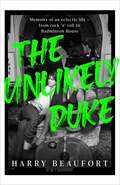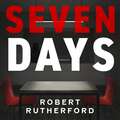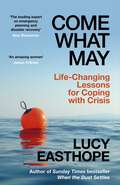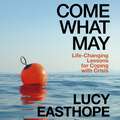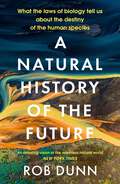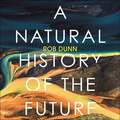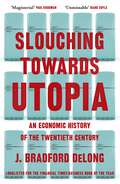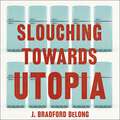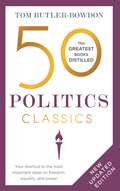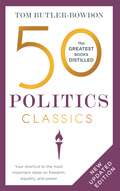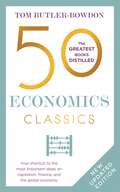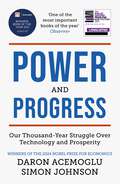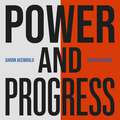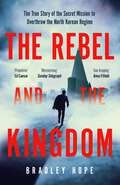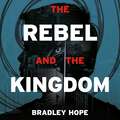- Table View
- List View
The Unlikely Duke: Memoirs of an eclectic life - from rock 'n' roll to Badminton House
by Harry Beaufort'Beaufort chronicles his unusual and rarified world with flashes of Wodehousian genius'. --- Jools Holland'So funny ... bristling with glamorous but eccentric characters'. --- Jilly Cooper'Very funny and touching, gentle, wise and unpretentious. This is a book I absolutely loved.' --- Anne GlenconnerThe 12th Duke of Beaufort, known to his friends as 'Bunter', inherited his Dukedom and Badminton House in 2017, at the age of sixty-five. But he is also a singer and songwriter with the rock group The Listening Device. Now he combines his responsibilities as Duke with his life as a rock performer. In this lively and anecdote-filled memoir, Harry Beaufort takes us behind the scenes of his varied life: from playing poker with politicians, to partying on Ibiza with film stars to people watching with The Queen from a balcony at Windsor Castle. He offers an intimate portrait of aristocratic privilege and a lifetime filled with rock stars, royalty, eccentrics and jaw-droppingly unbelievable stories. But Harry also offers a sensitive and perceptive insight into the worlds he has inhabited and the friendships and laughter that he has experienced along the way. This is the story of an ordinary man facing up to his extraordinary inheritance-the story of The Unlikely Duke.
The Unlikely Duke: Memoirs of an eclectic life - from rock 'n' roll to Badminton House
by Harry Beaufort'Beaufort chronicles his unusual and rarified world with flashes of Wodehousian genius'. --- Jools Holland'So funny ... bristling with glamorous but eccentric characters'. --- Jilly Cooper'Very funny and touching, gentle, wise and unpretentious. This is a book I absolutely loved.' --- Anne GlenconnerThe 12th Duke of Beaufort, known to his friends as 'Bunter', inherited his Dukedom and Badminton House in 2017, at the age of sixty-five. But he is also a singer and songwriter with the rock group The Listening Device. Now he combines his responsibilities as Duke with his life as a rock performer. In this lively and anecdote-filled memoir, Harry Beaufort takes us behind the scenes of his varied life: from playing poker with politicians, to partying on Ibiza with film stars to people watching with The Queen from a balcony at Windsor Castle. He offers an intimate portrait of aristocratic privilege and a lifetime filled with rock stars, royalty, eccentrics and jaw-droppingly unbelievable stories. But Harry also offers a sensitive and perceptive insight into the worlds he has inhabited and the friendships and laughter that he has experienced along the way. This is the story of an ordinary man facing up to his extraordinary inheritance-the story of The Unlikely Duke.
Seven Days: the instant Sunday Times bestseller: a gripping, high-octane crime thriller for 2024 - can Alice save her father from death row?
by Robert Rutherford'Wow! An absolutely fantastic edge of your seat thriller. I could not turn the pages fast enough... Would be an amazing film or tv series. The ending was perfect... Highly recommended' Reader review⭐⭐⭐⭐⭐Your father is on death row. You have seven days to save him. But do you want to?Alice knows her father is guilty of many things. He's guilty of abandoning her.He's guilty of being unfaithful to her mother.But is he guilty of murder?Now on Death Row, he has seven days to live.Some people want him released.Others will kill to keep him just where he is.Alice has only one chance to save him. But should she?Readers are loving Seven Days:'This was wild! Really enjoyed this. Good characters, good story line and it kept me guessing' Reader review⭐⭐⭐⭐⭐'Compulsive and page turning read... lots of surprises' Reader review⭐⭐⭐⭐⭐'A dark and atmospheric thriller that explores the complexities of family, trauma, and life, with a shocking ending, fantastic novel'⭐⭐⭐⭐⭐'Twisty, tense and superbly characterised, this global race against time and across the world is a top read'⭐⭐⭐⭐⭐'Kept me hooked from start to finish!'⭐⭐⭐⭐⭐'A high-octane, high-stakes thriller about family dynamics, guilt and responsibility'⭐⭐⭐⭐⭐
Seven Days: the instant Sunday Times bestseller: a gripping, high-octane crime thriller for 2024 - can Alice save her father from death row?
by Robert Rutherford'Wow! An absolutely fantastic edge of your seat thriller. I could not turn the pages fast enough... Would be an amazing film or tv series. The ending was perfect... Highly recommended' Reader review⭐⭐⭐⭐⭐Your father is on death row. You have seven days to save him. But do you want to?Alice knows her father is guilty of many things. He's guilty of abandoning her.He's guilty of being unfaithful to her mother.But is he guilty of murder?Now on Death Row, he has seven days to live.Some people want him released.Others will kill to keep him just where he is.Alice has only one chance to save him. But should she?Readers are loving Seven Days:'This was wild! Really enjoyed this. Good characters, good story line and it kept me guessing' Reader review⭐⭐⭐⭐⭐'Compulsive and page turning read... lots of surprises' Reader review⭐⭐⭐⭐⭐'A dark and atmospheric thriller that explores the complexities of family, trauma, and life, with a shocking ending, fantastic novel'⭐⭐⭐⭐⭐'Twisty, tense and superbly characterised, this global race against time and across the world is a top read'⭐⭐⭐⭐⭐'Kept me hooked from start to finish!'⭐⭐⭐⭐⭐'A high-octane, high-stakes thriller about family dynamics, guilt and responsibility'⭐⭐⭐⭐⭐
Seven Days: a gripping, high-octane crime thriller for 2024 - can Alice save her father from death row?
by Robert Rutherford'Wow! An absolutely fantastic edge of your seat thriller. I could not turn the pages fast enough... Would be an amazing film or tv series. The ending was perfect... Highly recommended' Reader review⭐⭐⭐⭐⭐Your father is on death row. You have seven days to save him. But do you want to?Alice knows her father is guilty of many things. He's guilty of abandoning her.He's guilty of being unfaithful to her mother.But is he guilty of murder?Now on Death Row, he has seven days to live.Some people want him released.Others will kill to keep him just where he is.Alice has only one chance to save him. But should she?Readers are loving Seven Days:'This was wild! Really enjoyed this. Good characters, good story line and it kept me guessing' Reader review⭐⭐⭐⭐⭐'Compulsive and page turning read... lots of surprises' Reader review⭐⭐⭐⭐⭐'A dark and atmospheric thriller that explores the complexities of family, trauma, and life, with a shocking ending, fantastic novel'⭐⭐⭐⭐⭐'Twisty, tense and superbly characterised, this global race against time and across the world is a top read'⭐⭐⭐⭐⭐'Kept me hooked from start to finish!'⭐⭐⭐⭐⭐'A high-octane, high-stakes thriller about family dynamics, guilt and responsibility'⭐⭐⭐⭐⭐
Alice: The Story of Princess Alice of Greece, Prince Philip's Extraordinary Mother
by Hugo VickersThe remarkable, moving story of Prince Philip's mother by eminent biographer Hugo Vickers, updated in this new edition - for fans of Kingmaker and The Lives and Deaths of the Princesses of Hesse'Gripping. Hugo Vickers has pulled off an extraordinary feat in describing the life - in many ways tragic - of Princess Andrew of Greece. It is not an exaggeration to say that this is a masterpiece.' - A. N. Wilson'Vickers tells this story with a sure touch and an expertise that only he can command' SUNDAY TIMES'A sympathetic, piquant and well-defined portrait of a spirited woman' LITERARY REVIEW'Sympathetic yet free of pathos, Vickers's life celebrates an unusual and fascinating woman' KIRKUS--------Princess Alice, mother of Prince Phillip, was something of a mystery figure even within her own family. Profoundly deaf, she was born at Windsor Castle in the presence of her great-grandmother, Queen Victoria, and brought up in England, Darmstadt, and Malta.In 1903 she married Prince Andrew of Greece and Denmark, and from then on her life was overshadowed by wars, revolutions, enforced periods of exile. Further crisis hit when, at the age of forty-five, she was removed from her family and placed in a sanatorium in Switzerland, where she was pronounced a paranoid schizophrenic. As her stay in the clinic became prolonged, there was a time where it seemed she might never walk free again.Yet she recovered.Illuminating and enthralling, eminent biographer Hugo Vickers's account of her life is as tumultuous and extraordinary as the times she lived through.
Alice: The Story of Princess Alice of Greece, Prince Philip's Extraordinary Mother
by Hugo VickersThe remarkable, moving story of Prince Philip's mother by eminent biographer Hugo Vickers, updated in this new edition - for fans of Kingmaker and The Lives and Deaths of the Princesses of Hesse'Gripping. Hugo Vickers has pulled off an extraordinary feat in describing the life - in many ways tragic - of Princess Andrew of Greece. It is not an exaggeration to say that this is a masterpiece.' - A. N. Wilson'Vickers tells this story with a sure touch and an expertise that only he can command' SUNDAY TIMES'A sympathetic, piquant and well-defined portrait of a spirited woman' LITERARY REVIEW'Sympathetic yet free of pathos, Vickers's life celebrates an unusual and fascinating woman' KIRKUS--------Princess Alice, mother of Prince Phillip, was something of a mystery figure even within her own family. Profoundly deaf, she was born at Windsor Castle in the presence of her great-grandmother, Queen Victoria, and brought up in England, Darmstadt, and Malta.In 1903 she married Prince Andrew of Greece and Denmark, and from then on her life was overshadowed by wars, revolutions, enforced periods of exile. Further crisis hit when, at the age of forty-five, she was removed from her family and placed in a sanatorium in Switzerland, where she was pronounced a paranoid schizophrenic. As her stay in the clinic became prolonged, there was a time where it seemed she might never walk free again.Yet she recovered.Illuminating and enthralling, eminent biographer Hugo Vickers's account of her life is as tumultuous and extraordinary as the times she lived through.
Come What May: Life-Changing Lessons for Coping with Crisis
by Lucy EasthopeAN UPLIFTING GUIDE TO NAVIGATING HARD TIMES, PERFECT FOR FANS OF DR JULIE SMITH AND JULIA SAMUELS 'An unlikely superhero' Sunday Times'An amazing woman' James O'Brien'Easthope is that rare thing, a genuine philosopher thinking through what she is doing in the mitigation of human suffering' New StatesmanWe all know that at some point in life, we will experience pain, uncertainty and loss. Widowhood, redundancy, a life-changing diagnosis, pregnancy loss, or a global pandemic. So how can we weather the storms, and cope with whatever comes next? No one can answer this better than Lucy Easthope, an emergency planner whose job is to support survivors of major disasters. She has been there after countless earthquakes, fires and floods. Time and again she has watched how people rebuild: the work, the pitfalls and the fragile joy. In Come What May, she distils for us what she has learned about how to carry on during and after terrible times. Through poignant stories and hard-won wisdom, she offers a roadmap for resilience in the face of adversity. She explains what shape the recovery journey might take, how to triage your life in an emergency, how to plan for 'the slump' (also known as the lasagne phase), how to take stock of what has happened to you, how to watch out for 'learned helplessness', and what good (and bad) help looks like. This is a book for all of us existing in 'the after' who want not just to survive, but to live and unleash strengths we never knew we had.
Come What May: Life-Changing Lessons for Coping with Crisis
by Lucy EasthopeAN UPLIFTING GUIDE TO NAVIGATING HARD TIMES, PERFECT FOR FANS OF DR JULIE SMITH AND JULIA SAMUELS 'An unlikely superhero' Sunday Times'An amazing woman' James O'Brien'Easthope is that rare thing, a genuine philosopher thinking through what she is doing in the mitigation of human suffering' New StatesmanWe all know that at some point in life, we will experience pain, uncertainty and loss. Widowhood, redundancy, a life-changing diagnosis, pregnancy loss, or a global pandemic. So how can we weather the storms, and cope with whatever comes next? No one can answer this better than Lucy Easthope, an emergency planner whose job is to support survivors of major disasters. She has been there after countless earthquakes, fires and floods. Time and again she has watched how people rebuild: the work, the pitfalls and the fragile joy. In Come What May, she distils for us what she has learned about how to carry on during and after terrible times. Through poignant stories and hard-won wisdom, she offers a roadmap for resilience in the face of adversity. She explains what shape the recovery journey might take, how to triage your life in an emergency, how to plan for 'the slump' (also known as the lasagne phase), how to take stock of what has happened to you, how to watch out for 'learned helplessness', and what good (and bad) help looks like. This is a book for all of us existing in 'the after' who want not just to survive, but to live and unleash strengths we never knew we had.
Come What May: Life-Changing Lessons for Coping with Crisis
by Lucy EasthopeAN UPLIFTING GUIDE TO NAVIGATING HARD TIMES, PERFECT FOR FANS OF DR JULIE SMITH AND JULIA SAMUELS 'An unlikely superhero' Sunday Times'An amazing woman' James O'Brien'Easthope is that rare thing, a genuine philosopher thinking through what she is doing in the mitigation of human suffering' New StatesmanWe all know that at some point in life, we will experience pain, uncertainty and loss. Widowhood, redundancy, a life-changing diagnosis, pregnancy loss, or a global pandemic. So how can we weather the storms, and cope with whatever comes next? No one can answer this better than Lucy Easthope, an emergency planner whose job is to support survivors of major disasters. She has been there after countless earthquakes, fires and floods. Time and again she has watched how people rebuild: the work, the pitfalls and the fragile joy. In Come What May, she distils for us what she has learned about how to carry on during and after terrible times. Through poignant stories and hard-won wisdom, she offers a roadmap for resilience in the face of adversity. She explains what shape the recovery journey might take, how to triage your life in an emergency, how to plan for 'the slump' (also known as the lasagne phase), how to take stock of what has happened to you, how to watch out for 'learned helplessness', and what good (and bad) help looks like. This is a book for all of us existing in 'the after' who want not just to survive, but to live and unleash strengths we never knew we had.
Defenders of the Faith: The British Monarchy, Religion and the Next Coronation
by Catherine PepinsterIn 1953, millions across Britain and the world were glued to their TV sets, watching the first televised coronation of a British monarch. What they saw was a deeply religious, medieval ritual. Since then Elizabeth II's reign has been profoundly shaped by her Christian faith, expressed in her coronation vows and in her 70 years as Queen, from her role as head of the Church of England, to her annual Christmas broadcasts, her encounters with Popes, Islam and the other religions of 21st Britain and the Commonwealth. Like her husband, Prince Philip, her faith can be described as her 'strength and stay' amid the turmoil of a nation becoming increasingly secular at the same time as her subjects become increasingly more varied in their religious beliefs. But what part will religion play in the reign of Charles III and in the coronation of a Prince of Wales who once pledged to be defender of faith, not just defender of the Christian faith? Is this the moment to junk an ancient ceremony and reinvent the Coronation to appeal to multicultural Britain, especially its young people, or one where the nation embraces tradition and its rich Coronation heritage? Could the coronation become a marketing device for ambitious politicians keen to use it to promote the image they want for Britain? Defenders Of The Faith explores the powerful connection between the British monarchy and religion, from its earliest times, to the Reformation, the Civil War, and the reconfigured wholesome family monarchy of Victoria and her successors, whose Christian faith steered their response to the atheistic regimes of fascism and communism that threatened Europe and their royal relatives.
A Natural History of the Future: What the Laws of Biology Tell Us About the Destiny of the Human Species
by Rob DunnOver the past century, our species has made unprecedented technological innovations with which we have sought to control nature. From river levees to enormous one-crop fields, we continue to try to reshape nature for our purposes - so much so it seems we may be in danger of destroying it.In A Natural History of the Future, biologist Rob Dunn argues that nothing could be further from the truth: rather than asking whether nature will survive us, better to ask whether we will survive nature. Despite our best - or worst - efforts to control the biological world, life has its own rules, and no amount of human tampering can rewrite them. Elucidating several fundamental laws of ecology, evolution, and biogeography, Dunn shows why life cannot be stopped. We sequester our crops on monocultured fields, only to find new life emerging to attack them. We dump toxic waste only to find microbes to colonize it. And even in the London Tube, we have seen a new species of mosquito emerge to take advantage of an apparently inhospitable habitat. Life will not be repressed by our best-laid plans. Instead, Dunn shows us a vision of the biological future and the challenges the next generations could face.A Natural History of the Future sets a new standard for understanding the diversity of life and our future as a species.
A Natural History of the Future: What the Laws of Biology Tell Us About the Destiny of the Human Species
by Rob DunnA leading ecologist argues that if humankind is to survive on a fragile planet, we must understand and obey its iron laws.Over the past century, our species has made unprecedented technological innovations with which we have sought to control nature. From river levees to enormous one-crop fields, we continue to try to reshape nature for our purposes - so much so it seems we may be in danger of destroying it.In A Natural History of the Future, biologist Rob Dunn argues that nothing could be further from the truth: rather than asking whether nature will survive us, better to ask whether we will survive nature. Despite our best - or worst - efforts to control the biological world, life has its own rules, and no amount of human tampering can rewrite them. Elucidating several fundamental laws of ecology, evolution, and biogeography, Dunn shows why life cannot be stopped. We sequester our crops on monocultured fields, only to find new life emerging to attack them. We dump toxic waste only to find microbes to colonize it. And even in the London Tube, we have seen a new species of mosquito emerge to take advantage of an apparently inhospitable habitat. Life will not be repressed by our best-laid plans. Instead, Dunn shows us a vision of the biological future and the challenges the next generations could face.A Natural History of the Future sets a new standard for understanding the diversity of life and our future as a species.(P) 2022 Hachette Audio
The Secret Hours: The Instant Sunday Times Bestselling Thriller from the Author of Slow Horses
by Mick HerronTHE INSTANT SUNDAY TIMES BESTSELLER**A 'Book of the Year' in The Times, Sunday Times, Guardian, Observer, Daily Telegraph, Spectator, Sunday Express, TLS, Irish Times*'Pure class' Ian Rankin 'Pitch-perfect' Lee Child'A powerful standalone spy thriller from a true contemporary master' Daily TelegraphTrying to investigate the Secret Service is like trying to get rid of the stink of dead badger. Hard.For two years the government's Monochrome inquiry has produced nothing more than a series of dead ends.The Service has kept what happened in the newly reunified Berlin under wraps for decades, and intends for it to stay that way.But then the OTIS file turns up.What classified secrets does it hold? And what damage will it create?All Max Janácek knows is that someone is chasing him through the pitch-dark country lanes and they want him gone.WE ALL HAVE JOBS TO DO IN THE DAYLIGHT. IT'S WHAT YOU DO IN THE SECRET HOURS THAT REVEALS WHO YOU REALLY ARE.'Wonderful . . . high action, a spinning moral compass, and hidden motives on every page' Michael Connelly*Mick Herron's The Secret Hours was a Sunday Times Number Four bestseller in hardback in the second week of September 2023
Waste Wars: Dirty Deals, International Rivalries and the Scandalous Afterlife of Rubbish
by Alexander Clapp'A mind-altering and unforgettable read' Adam Tooze'If you wish to know how the world really works, read this book' Misha GlennyA globe-trotting investigation into the catastrophic reality of the multi-billion-dollar global garbage trade.Dumps and landfills around the world are overflowing. The millions of tonnes of garbage generated every day have given rise to waste wars, cons and cover ups across thousands of miles and multiple oceans. And few people have any idea they're happening.Roaming across five continents, Alexander Clapp delves deep inside the world of Javanese recycling gangsters, cruise ship dismantlers in the Aegean, Tanzanian plastic pickers, whistle-blowing environmentalists in the jungles of Guatemala, and a community of Ghanaian boys who burn Western cellphones and televisions for cents an hour. He reveals how most of our trash actually lives a secret second life, getting shipped, smuggled or dumped from one country onto another, with devastating consequences for the poorest nations of the world.Waste Wars is a jaw-dropping exposé of how and why, for the last forty years, our garbage has spawned a massive global black market, one that offloads our consumption footprints onto distant continents, pristine landscapes, and unsuspecting populations.
Waste Wars: Dirty Deals, International Rivalries and the Scandalous Afterlife of Rubbish
by Alexander Clapp'A mind-altering and unforgettable read' Adam Tooze'If you wish to know how the world really works, read this book' Misha GlennyA globe-trotting investigation into the catastrophic reality of the multi-billion-dollar global garbage trade.Dumps and landfills around the world are overflowing. The millions of tonnes of garbage generated every day have given rise to waste wars, cons and cover ups across thousands of miles and multiple oceans. And few people have any idea they're happening.Roaming across five continents, Alexander Clapp delves deep inside the world of Javanese recycling gangsters, cruise ship dismantlers in the Aegean, Tanzanian plastic pickers, whistle-blowing environmentalists in the jungles of Guatemala, and a community of Ghanaian boys who burn Western cellphones and televisions for cents an hour. He reveals how most of our trash actually lives a secret second life, getting shipped, smuggled or dumped from one country onto another, with devastating consequences for the poorest nations of the world.Waste Wars is a jaw-dropping exposé of how and why, for the last forty years, our garbage has spawned a massive global black market, one that offloads our consumption footprints onto distant continents, pristine landscapes, and unsuspecting populations.
Slouching Towards Utopia: An Economic History of the Twentieth Century
by Brad de LongLONGLISTED FOR THE FINANCIAL TIMES BUSINESS BOOK OF THE YEAR AWARD 2022From one of the world's leading economists, a sweeping new history of the twentieth century - a century that left us vastly richer, yet still profoundly dissatisfied.Before 1870, most people lived in dire poverty, the benefits of the slow crawl of invention continually offset by a growing population. Then came a great shift: invention sprinted forward, doubling our technological capabilities each generation, and creatively destroying the economy again and again. Slouching Towards Utopia tells the story of the major economic and technological shifts of the 20th century in a bold and ambitious, grand narrative. In vivid and compelling detail, DeLong charts the unprecedented explosion of material wealth after 1870 which transformed living standards around the world, freeing humanity from centuries of poverty, but paradoxically has left us now with unprecedented inequality, global warming, and widespread dissatisfaction with the status quo. How did the long twentieth century fail to deliver the utopia our ancestors believed would be the inevitable result of such material wellbeing? How did humanity end up less on a march to progress than a slouch in the right direction? And what can we learn from the past in pursuit of a better world?
Slouching Towards Utopia: An Economic History of the Twentieth Century
by Brad de LongFrom one of the world's leading economists, a sweeping new history of the twentieth century - a century that left us vastly richer, yet still profoundly dissatisfied.Before 1870, most people lived in dire poverty, the benefits of the slow crawl of invention continually offset by a growing population. Then came a great shift: invention sprinted forward, doubling our technological capabilities each generation, and creatively destroying the economy again and again. Slouching Towards Utopia tells the story of the major economic and technological shifts of the 20th century in a bold and ambitious, grand narrative. In vivid and compelling detail, DeLong charts the unprecedented explosion of material wealth after 1870 which transformed living standards around the world, freeing humanity from centuries of poverty, but paradoxically has left us now with unprecedented inequality, global warming, and widespread dissatisfaction with the status quo. How did the long twentieth century fail to deliver the utopia our ancestors believed would be the inevitable result of such material wellbeing? How did humanity end up less on a march to progress than a slouch in the right direction? And what can we learn from the past in pursuit of a better world?(P) 2022 Hachette Audio
50 Politics Classics: Revised Edition, Your shortcut to the most important ideas on freedom, equality, and power
by Tom Butler-BowdonWhat if you didn't have to read the 50 most important books on Politics to know the most important ideas?This is the thinking person's guide to the big political texts from across the centuries, from the original pioneers to the contemporary. With insightful commentary for each of the 50 books, key quotes and biographical information on the authors and a guide to further reading,50 Politics Classics gives a unique overview of the political writings that shaped history and are still shaping minds today.From Abraham Lincoln to Nelson Mandela, and from Aristotle to George Orwell,50 Politics Classics distils the essence of the books, pamphlets, and speeches of the major leaders and great thinkers that drive real-world change. Spanning 2,500 years, left and right, thinkers and doers, Tom Butler-Bowdon covers activists, war strategists, visionary leaders, economists, philosophers of freedom, feminists, conservatives and environmentalists, right up to contemporary leaders and thought leaders such as Barack Obama, Isobel Wilkerson and Michael Pillsbury.Whether you consider yourself to be conservative, liberal, socialist, or Marxist, this book gives you greater understanding of the key ideas that matter in our politically charged times.
50 Politics Classics: Your shortcut to the most important ideas on freedom, equality, and power
by Tom Butler BowdonWhat if you didn't have to read the 50 most important books on Politics to know the most important ideas?This is the thinking person's guide to the big political texts from across the centuries, from the original pioneers to the contemporary. With insightful commentary for each of the 50 books, key quotes and biographical information on the authors and a guide to further reading, 50 Politics Classics gives a unique overview of the political writings that shaped history and are still shaping minds today. From Abraham Lincoln to Nelson Mandela, and from Aristotle to George Orwell, 50 Politics Classics distils the essence of the books, pamphlets, and speeches of the major leaders and great thinkers that drive real-world change. Spanning 2,500 years, left and right, thinkers and doers, Tom Butler-Bowdon covers activists, war strategists, visionary leaders, economists, philosophers of freedom, feminists, conservatives and environmentalists, right up to contemporary leaders and thought leaders such as Barack Obama, Isobel Wilkerson and Michael Pillsbury. Whether you consider yourself to be conservative, liberal, socialist, or Marxist, this book gives you greater understanding of the key ideas that matter in our politically charged times.The revised edition will:· include 5-6 new contemporary classics from White Fragility to Why Nations Fail and leaders and thought leaders such as Barack Obama, Isobel Wilkerson and Michael Pillsbury.· have a revised introduction to reflect on the seismic political movements that have blown up since the last edition· have some of the less relevant titles removed
50 Economics Classics: Your shortcut to the most important ideas on capitalism, finance, and the global economy
by Tom Butler BowdonEconomics drives the modern world and shapes our lives, but few of us feel we have time to engage with the breadth of ideas in the subject. 50 Economics Classics is the smart person's guide to two centuries of discussion of finance, capitalism and the global economy. From Adam Smith's Wealth of Nations to Thomas Piketty's bestseller Capital in the Twenty-First Century, here are the great reads, seminal ideas and famous texts, clarified and illuminated for all.The revised edition will:· include 5-6 new titles addressing some more up to date areas of the subject such as The Bitcoin Standard, The Age of Surveillance Capitalism and Discrimination and Disparities· have a revised introduction to reflect on the current turbulence and challenges facing the global economy over the next decade· have some of the less relevant titles removed'Something of a modern classic in its own right.' E&T magazine'50 Economics Classics is a celebration of the large imaginative canvasses of the great economists. Butler-Bowdon's choices are broad, interdisciplinary and compellingly idiosyncratic. His chapters are not simply straight summaries of the chosen works, but thoughtful reflections on why we should care about this or that book and what its relevance is for us today. Butler-Bowdon's renderings are done so well that one might never bother going back to the original! Professional economists, students and general readers alike will find much here to delight in and many new byways to explore.'Niall Kishtainy, Fellow in Economic History, London School of Economics
Power and Progress: Our Thousand-Year Struggle Over Technology and Prosperity
by Simon Johnson Daron Acemoglu'The blueprint we need for the challenges ahead' Shoshana Zuboff'If you are not already an addict of Daron Acemoglu and Simon Johnson's previous books, Power and Progress is guaranteed to make you one' Jared Diamond'A breathtaking tour of the history and future of technology' Abhijit Banerjee and Esther DufloA bold new interpretation of why technology has all too often benefited elites - and how we must reshape the path of innovation to create true shared prosperity.A thousand years of history and contemporary evidence make one thing clear. Progress is not automatic but depends on the choices we make about technology. New ways of organizing production and communication can either serve the narrow interests of an elite or become the foundation for widespread prosperity.Much of the wealth generated by agricultural advances during the European Middle Ages was captured by the Church and used to build grand cathedrals while the peasants starved. The first hundred years of industrialization in England delivered stagnant incomes for workers, while making a few people very rich. And throughout the world today, digital technologies and artificial intelligence increase inequality and undermine democracy through excessive automation, massive data collection, and intrusive surveillance.It doesn't have to be this way. Power and Progress demonstrates that the path of technology was once - and can again be - brought under control. The tremendous computing advances of the last half century can become empowering and democratizing tools, but not if all major decisions remain in the hands of a few hubristic tech leaders striving to build a society that elevates their own power and prestige.With their breakthrough economic theory and manifesto for a better society, Acemoglu and Johnson provide the understanding and the vision to reshape how we innovate and who really gains from technological advances so we can create real prosperity for all.
Power and Progress: Our Thousand-Year Struggle Over Technology and Prosperity
by Simon Johnson Daron AcemogluTwo bestselling authors deliver a bold new interpretation of why technology has all too often benefited elites - and how we must reshape the path of innovation to create true shared prosperity.A thousand years of history and contemporary evidence make one thing clear. Progress is not automatic but depends on the choices we make about technology. New ways of organizing production and communication can either serve the narrow interests of an elite or become the foundation for widespread prosperity.Much of the wealth generated by agricultural advances during the European Middle Ages was captured by the Church and used to build grand cathedrals while the peasants starved. The first hundred years of industrialization in England delivered stagnant incomes for workers, while making a few people very rich. And throughout the world today, digital technologies and artificial intelligence increase inequality and undermine democracy through excessive automation, massive data collection, and intrusive surveillance.It doesn't have to be this way. Power and Progress demonstrates that the path of technology was once - and can again be - brought under control. The tremendous computing advances of the last half century can become empowering and democratizing tools, but not if all major decisions remain in the hands of a few hubristic tech leaders striving to build a society that elevates their own power and prestige.With their breakthrough economic theory and manifesto for a better society, Acemoglu and Johnson provide the understanding and the vision to reshape how we innovate and who really gains from technological advances so we can create real prosperity for all.(P) 2023 Hachette Audio
The Rebel and the Kingdom: The True Story of the Secret Mission to Overthrow the North Korean Regime
by Bradley Hope'A propulsive investigation into the wild adventures of a man determined to bring down the North Korean regime . . . Deeply reported and novelistic. I flew through it' Ed Caesar, author of The Moth and the Mountain'The engrossing inside story of two recent events that are jaw dropping even for North Korea, and the obsessive man behind them . . . A terrific piece of up-close reportage that reads like a spy thriller but is all too real' Anna Fifield, author of The Great Successor: The Secret Rise and Rule of Kim Jong UnThe wild story of a college activist's high-stakes attempt to topple the North Korean regime and change the world.In the early 2000s, Adrian Hong was a soft-spoken Yale undergraduate looking for his place in the world. After reading a harrowing account of life inside North Korea, he realized he had found a cause so pressing that he was ready to devote his life to it. What began as a trip down the safe and well-worn path of organizing soon morphed into something more dangerous. Hong journeyed to China, outwitting Chinese security services as he helped ferry asylum-seeking North Korean escapees to safety. Meanwhile, Hong's secret organization, Cheollima Civil Defense (later renamed Free Joseon), began tracking the North Korean government's activities, and its volatile third-generation ruler, Kim Jong Un. Free Joseon targeted North Korean diplomats who might be persuaded to defect, while drawing up plans for a government-in-exile. After the shocking broad-daylight assassination in 2017 of Kim Jong Nam, the dictator's older brother, Hong, along with Marine veteran Christopher Ahn, helped ferry Nam's family to safety. Then Hong took the group a step further. He initiated a series of high-stakes direct actions, culminating in an armed raid at the North Korean embassy in Madrid-an act that would put Ahn behind bars and turn Hong into one of the world's most unlikely fugitives. In the tradition of Jon Krakauer's Into the Wild, The Rebel and the Kingdom is an exhilarating account of a man who turns his back on the status quo-to instead live boldly by his principles. Acclaimed journalist and bestselling author Bradley Hope-who broke numerous details of Hong's operations in The Wall Street Journal-now reveals the full contours of this remarkable story of idealism and insanity, hubris and heroism, all set within the secret battle for the future of the world's most mysterious and unsettling nation.
The Rebel and the Kingdom: The True Story of the Secret Mission to Overthrow the North Korean Regime
by Bradley HopeThe wild story of a college activist's high-stakes attempt to topple the North Korean regime and change the world.In the early 2000s, Adrian Hong was a soft-spoken Yale undergraduate looking for his place in the world. After reading a harrowing account of life inside North Korea, he realized he had found a cause so pressing that he was ready to devote his life to it. What began as a trip down the safe and well-worn path of organizing soon morphed into something more dangerous. Hong journeyed to China, outwitting Chinese security services as he helped ferry asylum-seeking North Korean escapees to safety. Meanwhile, Hong's secret organization, Cheollima Civil Defense (later renamed Free Joseon), began tracking the North Korean government's activities, and its volatile third-generation ruler, Kim Jong Un. Free Joseon targeted North Korean diplomats who might be persuaded to defect, while drawing up plans for a government-in-exile. After the shocking broad-daylight assassination in 2017 of Kim Jong Nam, the dictator's older brother, Hong, along with Marine veteran Christopher Ahn, helped ferry Nam's family to safety. Then Hong took the group a step further. He initiated a series of high-stakes direct actions, culminating in an armed raid at the North Korean embassy in Madrid-an act that would put Ahn behind bars and turn Hong into one of the world's most unlikely fugitives. In the tradition of Jon Krakauer's Into the Wild, The Rebel and the Kingdom is an exhilarating account of a man who turns his back on the status quo-to instead live boldly by his principles. Acclaimed journalist and bestselling author Bradley Hope-who broke numerous details of Hong's operations in The Wall Street Journal-now reveals the full contours of this remarkable story of idealism and insanity, hubris and heroism, all set within the secret battle for the future of the world's most mysterious and unsettling nation.'A propulsive investigation into the wild adventures of a man determined to bring down the North Korean regime . . . Deeply reported and novelistic. I flew through it' Ed Caesar, author of The Moth and the Mountain'The engrossing inside story of two recent events that are jaw dropping even for North Korea, and the obsessive man behind them . . . A terrific piece of up-close reportage that reads like a spy thriller but is all too real' Anna Fifield, author of The Great Successor: The Secret Rise and Rule of Kim Jong Un(P) 2022 Penguin Audio
